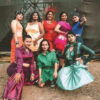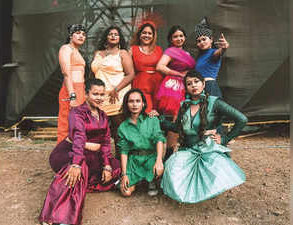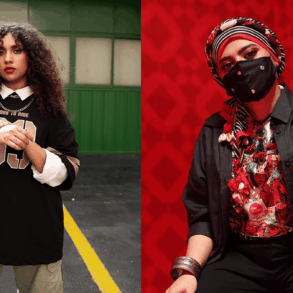
I’m no stranger to random epiphanies, but strangely enough, one hit me while attending a rap concert earlier this year.
Now, for context, when I’m at a concert, especially those of the hip-hop persuasion, I’m a completely different animal. I’m either holding onto the nostalgia of my 20s by recording myself going bar for bar with the artist with a drink in my hand (will I age myself if I admit that these are Snapchat videos?) or in a trance-like state, quietly admiring the experience.
But this time was different.
How about we take this to the next level?
Subscribe to our newsletter for a refreshing cocktail (or mocktail) of LGBTQ+ entertainment and pop culture, served up with a side of eye-candy.
I sat silently, keenly observing everyone around me jamming to the melodic rhymes of the male rappers, but for some reason, I wasn’t. I was entertained, but the connection felt flat, and halfway through the show, I realized why — there were no women on the lineup. In that moment, I realized that my lack of connection to the featured artists wasn’t rooted in disinterest. It was because I didn’t see myself in them in the way I do with women rappers.
I remember, in high school, straight male peers would gather around the lunch table and fondly discuss artists like Drake, Lil Wayne, Jeezy, and more. Truthfully, those conversations never resonated with me; again, I just didn’t see myself in them.
As a quirky, queer boy I was more interested in conversing about women like Trina and Nicki Minaj whose artistries and style were more my speed. Their unwavering audacity in surviving and thriving in a patriarchal construct that manifested in fierce rhymes, iconic fashion moments, and inclusive fan bases did much more for my self-esteem than that of their male counterparts. It’s no shade; I just wanted to spend time with the girls!

The blatant homophobia and misogyny that have been and still are prevalent in the genre were probably why I gravitated towards these women. In the same way those dark undertones of hip-hop made it clear boys like me weren’t welcome, the inclusivity of women hip-hop artists opened the doors for me to enjoy it in the same way my peers did.
I’ll never forget the excitement of sitting in class, dissecting Trina’s lyrics alongside my best friend and wishing upon a star that I’d be as cool as the Miami artist one day. I’ll never forget how badass I felt on my 16th birthday, listening to Nicki Minaj spit spicy one-liners about herself and how, in turn, that elevated my self-confidence. Their swagger and unmitigated gall in using their music to tell the world who they are, despite harsh criticisms of their craft and sexuality, rooted in misogyny, taught me valuable lessons.
While I’m not a woman or a rapper, I do know how it feels to be judged solely on my appearance and sexuality while navigating an oppressive system that only values straight, white men. I’d even go so far as to say that women in hip-hop have saved my life, which is why I’m so adamant about supporting this current generation poised to take their proverbial crowns.
Like Beyoncé and everyone else with good taste, I love Doechii. That love was only amplified when she said, in a recent interview, “My literal existence as a queer Black woman is a major contribution to the hip-hop genre.” It filled me with joy because, not only is she speaking the truth but I thought about how incredible it must be for this latest generation of queer boys who get to experience and find themselves in her and her peers’ music.
While there may have been a paucity of female MCs for my generation growing up (due to systemic barriers, not a lack of talent), it warms my heart to witness this golden age of hip-hop. I love seeing women like Megan Thee Stallion, Kash Doll, Flo Milli, Latto, Glorilla, Doechii, and many more curate those same spaces of belonging that their predecessors did for me. Truthfully, I’m not sure who I’d be without them.
At 31, my heart still pumps with twinges of elation when one of my favs releases a new project. I still leave their concerts with an overwhelming sense of pride and a sore throat from performing their discography, as if I had written the lyrics myself. Women in hip-hop have had a profound impact on my life, and I’m eternally grateful for the lessons they’ve taught me about myself, the world, and, of course, men. They have my eternal gratitude for making this queer boy feel like he’s welcomed in the genre, back then and now, to this day.
Related*
Sign up for the Queerty newsletter to stay on top of the hottest stories in LGBTQ+ entertainment, politics, and culture.
This post was originally published on this site be sure to check out more of their content.








